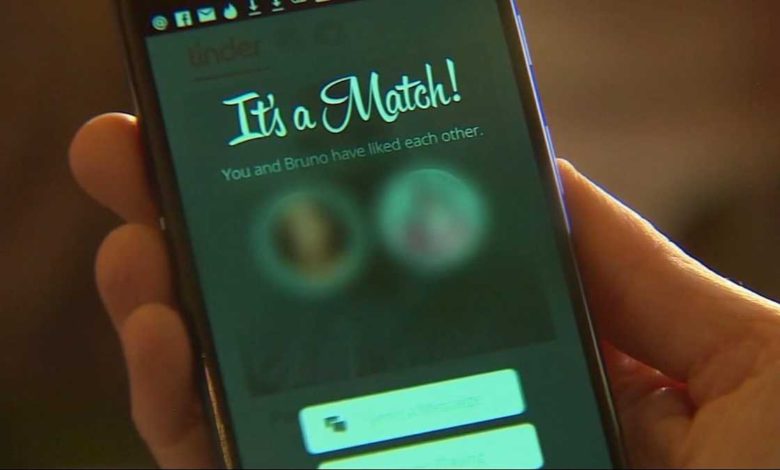
PERSON YOU’RE TALKING TO ONLINE DATING IS HARD ENOUGH WITHOUT BEING SURE WHO YOU’RE REALLY MESSAGING. ANGIE. BARNETT SAYS THERE ARE SEVERAL REVERS IMAGEE SITES TO DO SOME DETECTIVE WORK AGIMES.GOOGLE.COM. PUT THAT PHOTO IN WHAT YOU WILL DETECT IS WHO PHOTO IS BEING USED OTHER SITES OTHER PLASCE AND YOUAY M FIND IT’S BEING USED WITH DIFFERENT PROFILESF O DIFFERENT PEOPLE AND TTHA IS ONE OF YOUR BIGGEST WARNING SIGNS ROMANCE SCAMMERS WLIL ALSO TRY TO BUILD TRUST QUICKLY AND MOVE YOU OFF OF A DATING SITE IN ORDERO T TAKE YROU MONEY OR YOUR IDENTITY. THEY ARE GOING TO SAY I’VE NEVER FELT THIS WAY BEFORE I’M SO IN LOVE WITH YOU AND THEY'L’ TELL YOU SOME HARD LUCK STORY TO GET YOU TO EITHER SEND MONEY OR GIVE OVER YOUR CREDIT CARD FOINRMATION. THEY WILL EVENTUALLYIVE G YOU PLAUSIBLE REASONS WHY THEY NEED MONEY. THEY CAN’TET G IT ACCESS IT QUICKLY AND THEY’LL ASK YOU FOR THE MONEY. BARNETT SAYS PEW RESEARCH SWSHO 30% OF ONLINE DATERS ARE 50 AND OLDER AND SUSCEPTIBLE TO LOSING ETH MOST AMOUNT OF MONEY WHILE KNOWING WHAT TO LOOK FOR CAN HELP. SHE ALSO SAYS YOU SHOULD CHECK WEBSITE OR APP REVIEWS BEFORE CREATING A PROFILE PUT IN COMPLAINTS REVIE SCAMWS AND LOOK AND SEE WHAT OTHERS HAVE. TO SAY ABOUT IT. THAT’S A TACTIC BETTER BUSINSES BUREAU USES ALL THE TIME. BARNETT SAYS ANOTHER RED FLAG THAT YOU SUPPORT GRAMMAR OR PHRASES THAT JUST DON’T QUITE MAKE SENSE FOR A FULL LIST OF RESOURCES HEAD TO OUR WEBSITE HERE
BBB warns of 'romance scams' ahead of Valentine's Day
With Valentine's Day around the corner, the Better Business Bureau is warning about romance scams. There are some steps people can take to protect themselves before dating online.According to the BBB, most online dating scams start with fake pictures -- basically good-looking men and women to get people on the hook, but there are some ways to find out if that picture is really of the person you are talking to online.Angie Barnett, president and CEO of BBB of Greater Maryland, said there are several reverse image sites to do some detective work. "Images.google.com -- put that photo in and what you will detect is where that photo is being used, other sites, other places and you may find. It's being used with different profiles and different people and that is one of your biggest warning signs," Barnett said.Romance scammers will also try to build trust quickly and move you off a dating site in order to take your money or your identity."They are going to say, 'I've never felt this way before, I'm so in love with you,'" Barnett said.They'll tell you a hard-luck story to get you to either send money or give over your credit card number."They will eventually give you plausible reasons why they need money. They can't get it quickly and they'll ask you for the money," Barnett said.Barnett said Pew Research shows 30% of online daters are 50 and older, and susceptible to losing the most amount of money. While knowing what to look for can help, she also said people should check website or app reviews before creating a profile. "Put in complaints, reviews, scam and look to see what others have to say about it. That's a tactic BBB uses all the time," she said.Barnett said another red flag is more red, poor grammar or using phrases that just seem off.Resources and tips to protect yourself from scams:First, make sure the dating website you are using is "legit". If it is an unfamiliar site, type in the website name along with the words "reviews" and "scams," keeping a close eye out for past users who the site might be fake or problematic.Use your credit card to pay for online services and membership. This way you can dispute any unauthorized charges if you find yourself at a fake website.Never send money or personal information that can be used for identity theft to someone you’ve never met in person. Never give someone your credit card information to book a ticket to visit you. Cut off contact if someone starts asking you for information like credit card, bank, or government ID numbers.Ask specific questions about details given in a profile. A scammer may stumble over remembering details or making a story fit.Do your research. Many scammers steal photos from the web to use in their profiles. You can do a reverse image lookup using a website like tineye.com or images.google.com to see if the photos on a profile are stolen from somewhere else. You can also search online for a profile name, email, or phone number to see what adds up and what doesn't.
With Valentine's Day around the corner, the Better Business Bureau is warning about romance scams.
There are some steps people can take to protect themselves before dating online.
According to the BBB, most online dating scams start with fake pictures -- basically good-looking men and women to get people on the hook, but there are some ways to find out if that picture is really of the person you are talking to online.
Angie Barnett, president and CEO of BBB of Greater Maryland, said there are several reverse image sites to do some detective work.
"Images.google.com -- put that photo in and what you will detect is where that photo is being used, other sites, other places and you may find. It's being used with different profiles and different people and that is one of your biggest warning signs," Barnett said.
Romance scammers will also try to build trust quickly and move you off a dating site in order to take your money or your identity.
"They are going to say, 'I've never felt this way before, I'm so in love with you,'" Barnett said.
They'll tell you a hard-luck story to get you to either send money or give over your credit card number.
"They will eventually give you plausible reasons why they need money. They can't get it quickly and they'll ask you for the money," Barnett said.
Barnett said Pew Research shows 30% of online daters are 50 and older, and susceptible to losing the most amount of money. While knowing what to look for can help, she also said people should check website or app reviews before creating a profile.
"Put in complaints, reviews, scam and look to see what others have to say about it. That's a tactic BBB uses all the time," she said.
Barnett said another red flag is more red, poor grammar or using phrases that just seem off.
Resources and tips to protect yourself from scams:
- First, make sure the dating website you are using is "legit". If it is an unfamiliar site, type in the website name along with the words "reviews" and "scams," keeping a close eye out for past users who the site might be fake or problematic.
- Use your credit card to pay for online services and membership. This way you can dispute any unauthorized charges if you find yourself at a fake website.
- Never send money or personal information that can be used for identity theft to someone you’ve never met in person. Never give someone your credit card information to book a ticket to visit you. Cut off contact if someone starts asking you for information like credit card, bank, or government ID numbers.
- Ask specific questions about details given in a profile. A scammer may stumble over remembering details or making a story fit.
- Do your research. Many scammers steal photos from the web to use in their profiles. You can do a reverse image lookup using a website like tineye.com or images.google.com to see if the photos on a profile are stolen from somewhere else. You can also search online for a profile name, email, or phone number to see what adds up and what doesn't.
Source link









